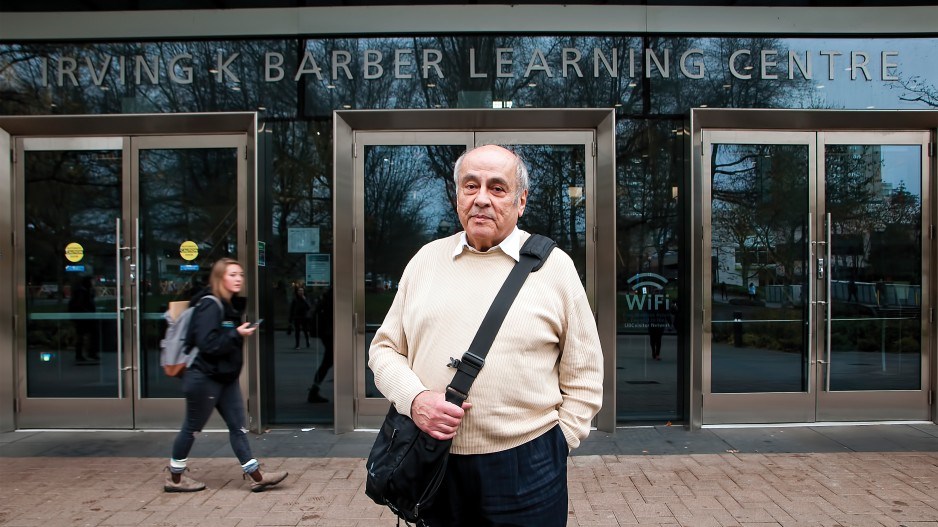When Harold Rubin decided to pack in his law career four and a half years ago at the age of 73, he had no intention of putting his feet up, relaxing and playing bridge like so many of his retired friends. Instead, he decided to hit the books, benefiting from free tuition for seniors 65 and over first at Capilano University on the North Shore and then at the University of British Columbia (UBC).
He was seized by a passion for studying that had seemed to elude him when he was a young man.
As a young man, he flunked a university-level English class three times. Yet with his return to the classroom as a septuagenarian, he found himself acing the very same type of literature classes.
Now, while pursuing a degree in history and political science at UBC, he can’t wait for some of his classes. Like one on modern Chinese history. The professor is so good, “the class comes alive better than a movie.”
His wife, three children, eight granddaughters and two great-grandchildren seem to understand his love of learning, but some of his friends can’t figure out why he doesn’t take it easy and play competitive bridge, which was once his pastime. That’s not nearly as exciting for him as wrapping his mind around Shakespeare and the arcane workings of the European Union.
Unlike his early days as a student, he doesn’t skip classes, takes neat notes and keeps them so organized, a school marm would beam with approval. He also enjoys writing exams because he finds they help to keep his memory sharp.
“I’m finally learning all the stuff I should have learned before I became a lawyer. I would have been a better lawyer maybe.”
He has no intention of abandoning his studies. Now, at 77, he is contemplating getting a master’s degree in international law.
It helps that he practised law for 49 years in a career that took him before the Supreme Court of Canada over 30 times. Today, writing a university paper or two doesn’t seem so daunting.
“I traded one obsession for another,” he says. “And most important, it’s free.”
The breaks offered to seniors by universities in the province are as varied as the diverse B.C. landscape.
The best deal appears to be at UBC, where seniors 65 and over don’t pay tuition or student fees for most degree programs, with professional programs like law, medicine, dentistry, nursing and pharmacy or any faculty or school where resources are limited forming the exception. Twenty-five students over 65 are currently enrolled in credit courses.
Capilano University on the North Shore and Langara in Vancouver all waive tuition for students 65 and over but charge students fees like student union and term enrolment fees. Langara adds the stipulation that free tuition applies only to regular classes rather than continuing education classes, which are more hobby-oriented, and seniors can get into the regular classes tuition-free only if there are seats available after the regular registration period.
In all of the above cases, seniors are expected to pay for course materials, which can run around $100 to $150 per course.
The worst deal for seniors seems to be in Victoria, where neither Royal Roads University nor the University of Victoria gives any kind of a deal or special program to seniors.
Simon Fraser University also does not waive tuition and fees for students 65 and over who are seeking degrees or taking credit classes, although it has a liberal arts, 55-plus program at its downtown Harbour Centre campus that caters to an aging demographic. Roughly a thousand students are registered per term in the non-credit program that offers mostly six-week courses featuring two hours of lectures per week. With the university subsidizing the program, the cost is $110 per course, which gets reduced to $25 if you have gross income not exceeding $24,328 as a single person or $30,286 as a couple.
The menu of courses covers everything from history, literature, film and psychology to science, math and physics.
Mark Smith, acting program director, says students 55 and over often enrol because they want to stay mentally active or they have had a hankering to pursue an interest but weren’t able to until now because they were too busy raising families or working.
“They are coming now for the joy of learning.”
For instructors, it’s a chance to share their passion with an eager student body.
“The instructors love coming here because the [older] students really pay attention,” says Smith. “They are not on their phones. They are not worried about finishing a course and getting a credit. They are there for the actual interest.”




